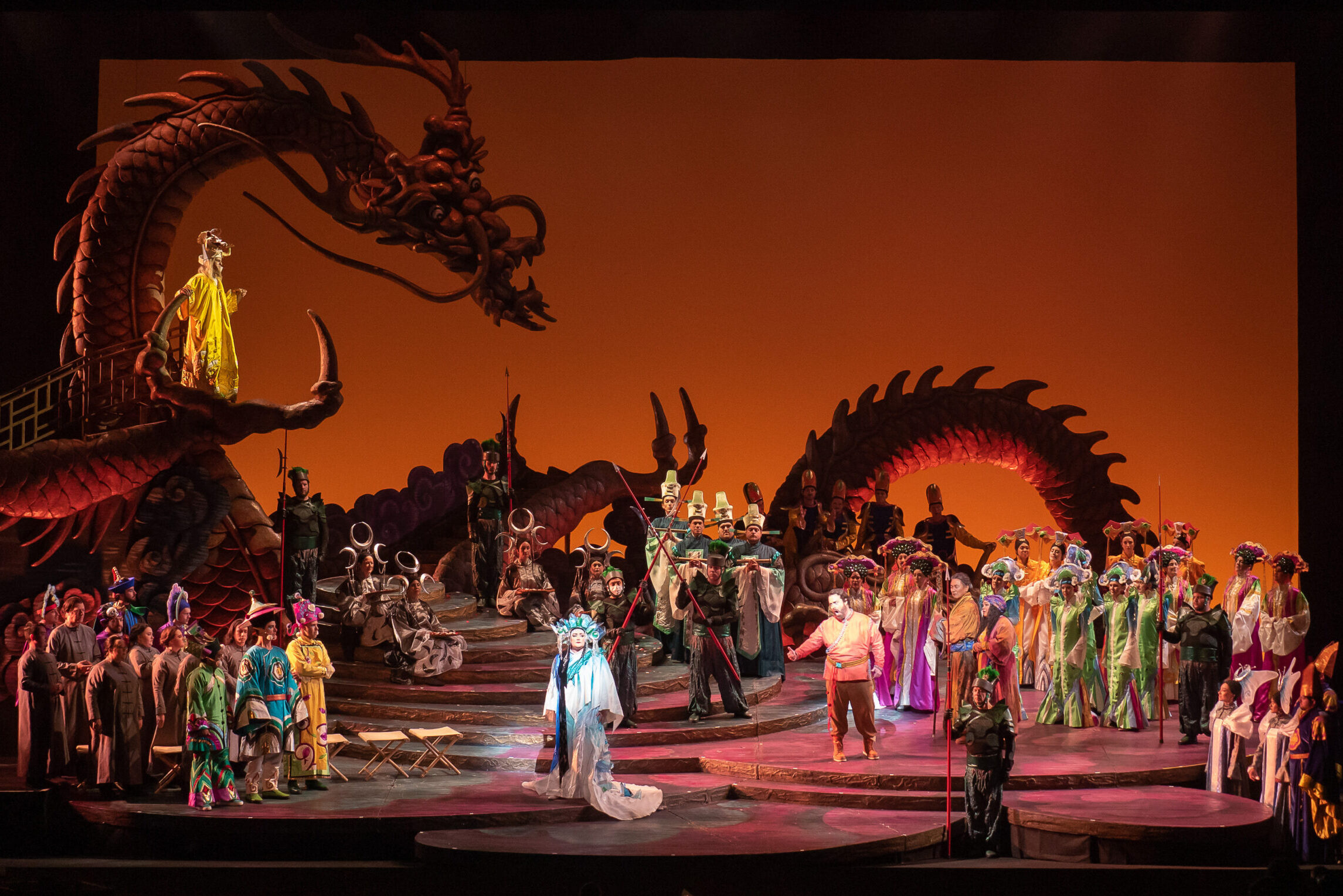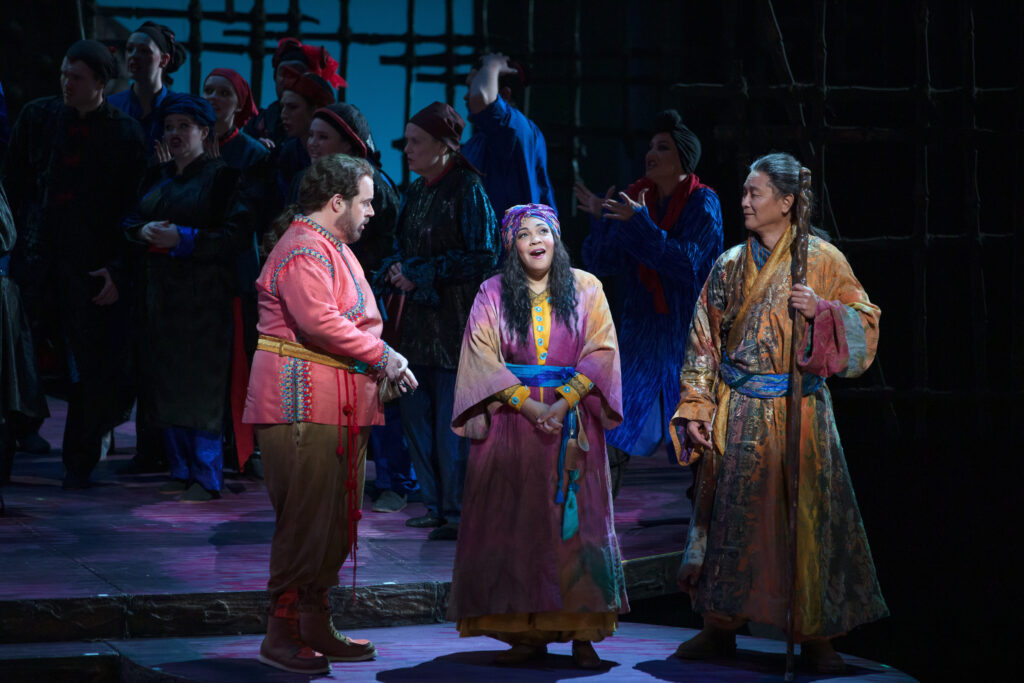
A new staging of a culturally insensitive opera has community members and artists debating the value of racially stereotypical art and the conversation — or lack of one — that it can spark.
Opera Colorado is producing Puccini's “Turandot” as the last show of its 40th season. It is a popular opera, staged often and all over the world, but it also includes sexist and racist themes. The new production is raising questions about art's inherent value despite the presence of racial insensitivity. In this case, about yellowface and cultural appropriation.
To address concerns about the racist material, Opera Colorado officials say they have tried to be at the forefront of discussions with the community, and in the rehearsal room. Their goal is to gain knowledge and learn how to tactfully produce a controversial performance.
In February, Opera Colorado acknowledged and attempted to address the difficult questions about “Turandot” at a community panel discussion co-hosted by Rocky Mountain Public Media.
The first question from the audience that night demonstrated that for many, this opera inflicts deep pain.
“The other thing that you asked was what is the impact on the community? And it is the perpetuating stereotypes of the Dragon Lady,” said Mary Lee Chin at the discussion. “I believe there are also characters … that is so reminiscent of the taunting that I received. And so when you have things like that, it really has a negative impact on the community.”
Gregory Carpenter is the general director and artistic director of Opera Colorado. He said it was important to have those conversations around the show and its racism early and that he believes they accomplished their goal to listen and understand.
“Part of acknowledging the challenge of putting on a production of “Turandot,” was to have a community conversation and to open ourselves up to conversation, to question and engage the AAPI community in a productive engagement exercise,” Carpenter said. “And then to say, how do we do our best job at mitigating some of the concerns of that community within the context of keeping this great opera that people love alive for the future. “
“Turandot” is a popular opera and can have a positive impact on the financial health of an opera company that stages a production of it. However, the challenging components of the storytelling, and the question of Asian representation in casting remain.
Carpenter said that Opera Colorado would never produce Porgy and Bess with a white cast, for example. But “Turandot” is being staged with a predominantly white cast.
“You know, it is a huge challenge. But I think, one of the [things], at least early on for me, was to say, ‘How do we use a piece like this, which is fantasy?’” Carpenter said, adding that the piece doesn’t contain any actual historical facts.“There's no specific truth you might say in the way ancient China, ancient Peking is represented. It's a fantasy.
“It's Puccini's vision through the lens of his fascination with Chinoiserie or Orientalism. All those movements that came out of the late 19th century, early 20th century. It's him projecting, you might say, an Italian perspective on what they thought Peking was. Nobody had been to China, Puccini never went to China and actually experienced anything in person. So it was all fantasy.”
Carpenter said the company tried to strip elements of the work out that they felt were misrepresentative. Instead, they focused on creating a purely fantastical world.

“It's just a world that is not a true representation of Chinese culture in any way, shape or form,” Carpenter said.
Carpenter said casting people who can perform such difficult roles is “both an art and a science.”
“You've got to look at each of those roles, understand the vocal demands of each of those roles, and then say, ‘Where do we go to find people singers that can meet those demands?’”
Aria Umezawa is the stage director for Opera Colorado’s production. She said “Turandot” is personally challenging for her and that she knows other challenging discussions are happening in opera about responsible representation.
“I know in the case of this particular production, a lot of thought was put into how to downplay the potential harm of the representation in this production,” Umezawa said. “I will say, I'm not sure that we were entirely successful. We did what we could.”
Still, Umezawa said she is viewing it as a first step toward the internal work to be done to build relationships between the company and with the AAPI community in Colorado
“I have very, very dear colleagues and friends who are AAPI of various backgrounds, who, for example, their dream role is “Turandot” or Madama Butterfly,” that truly, they really desire to engage with this. They feel inspired by the material, in different ways it resonates. It might have been the show that they saw that indicated to them that they had a place in the opera industry. It's complicated,” Umezawa said.
Margaret Ozaki Graves is a soprano and a member of several AAPI community organizations. While she isn’t in this production at Opera Colorado, producers did invite her to participate on the community panel discussing the production.
“Being an opera lover and an insider myself, I think I understand what a big leap that was for the company,” Ozaki Graves said. “Unlike a lot of other disciplines and other industries, opera is very early in its DEI journey. So, the fact that there was a panel and that they invited Asian-identifying people from across the community to participate is very significant.”
This is Martin Bakari’s first production of “Turandot.” He said it’s one of his favorite Puccini operas, but that he and the rest of the cast are aware of and consider the difficult questions around the piece.
“We're constantly aware of this, even before our recent kind of awakening to the importance of all this stuff. We've always been thoughtful of it,” Bakari said. “We're significantly more thoughtful of it now. I'm Asian, the director herself, she's half Japanese, and so, I mean, we're thinking about this stuff. But I mean, truth be told, this story, although it technically takes place in China, it is really more of a sort of mythical fantasy that is set in the undetermined past …. So, the idea of cultural appropriation is something that I personally am a little bit less concerned about with a piece like this.”
Opera Colorado’s Artistic director Gregory Carpenter acknowledges that “Turandot” presents many challenges, but he says Opera Colorado is up to tackling them.
“In the most challenging of times, we don't put our head down, we face forward and we move ahead and we get creative and we make tough decisions,” Carpenter said. “And in the best of times, we take advantage of everything that is within our grasp and we do it with intelligence. We do it in service to our community. We do it with our patrons in mind.”
Opera Colorado production of Puccini’s “Turandot” plays the Ellie Caulkins Opera House May 6, 9, 12, and 14.
Editor’s Note: Opera Colorado is a financial supporter of CPR News, but has no editorial influence.









